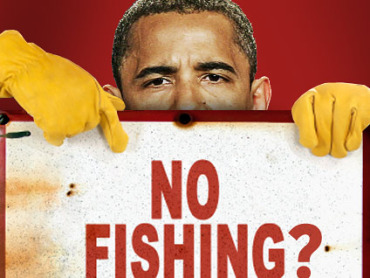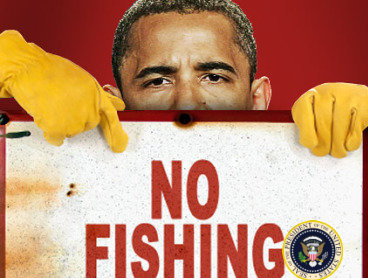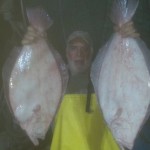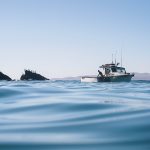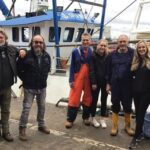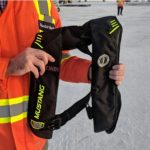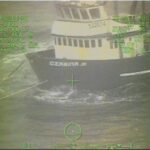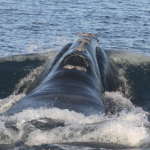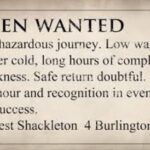Tag Archives: Hawaii Longline Association
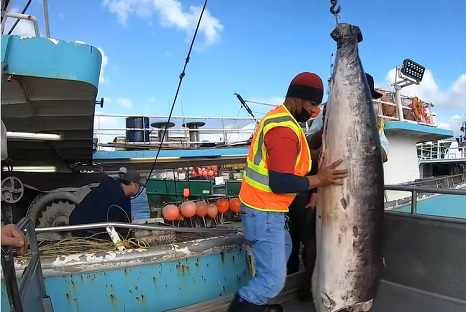
Have you tried the other white meat? … Swordfish
Hawaii’s commercial fishing industry is asking Hawaii families to consider (or reconsider) a fish that’s fallen out of favor over the years. While Hawaii is known for its ahi and other tuna, swordfish is actually a big part of the commercial fishing industry in the islands. So much so that the Hawaii Longline Association says its fleet provides about half the country’s demand for swordfish, caught more than 1,000 miles north of Hawaii. But while more than 80% of the fresh fish sold in Hawaii stays here, that’s not the case for swordfish. “It’s kind of reverse, most goes to the mainland instead of retain here locally,” said Eric Kingma, executive director of the Hawaii Longline Association. Video, >click to read< 08:49
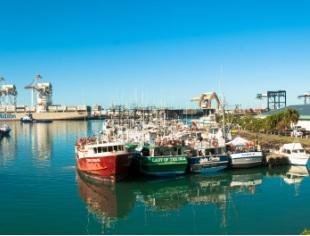
Hawaii Longline Fishery Achieves Global Sustainability Certification
The Hawaii Longline Association’s swordfish, bigeye, and yellowfin tuna fishery has achieved certification for sustainable fishing practices, the Marine Stewardship Council announced today. The fishery is the first Hawaii fishery to enter the MSC program. The MSC Fisheries Standard is a globally recognized standard used to assess if a fishery is well-managed and reflects the most up-to-date understanding of internationally accepted fisheries science and management. The certification follows a rigorous 16-month review carried out by third-party assessment body Control Union UK Limited. >click to read< 16:09
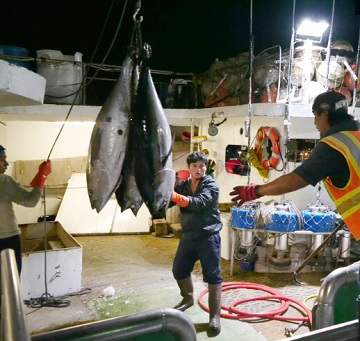
State Supreme Court: Hawaii Longline Industry’s Use of Foreign Crews OK
A new Hawaii Supreme Court decision upholds the local longline fleet’s reliance on some 700 foreign fishermen who can’t legally leave the dock when their boats arrive in Honolulu Harbor. Specifically, the opinion, released Thursday, ruled that it’s OK for state officials to grant commercial licenses to those fishermen confined to the pier, even though they have no legal status in the U.S. It’s permissible, the court said, because Hawaii’s fleet of 140 or so longline vessels fish for ahi and other fresh seafood only in the deep ocean, not in the state-designated waters closer to shore. Meanwhile, the Hawaii Longline Association said it was pleased with the Supreme Court opinion. >click to read< 18:47
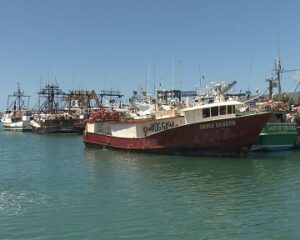
Hawaii fishermen on the hook for high costs as seafood prices continue to rise
You may be seeing trouble when you pull out your wallet to pay for fish and seafood, but it’s the fishing industry that’s threatened right now. As fisherman Paul Dodder prepares to once again head out to sea. Expenses are on his mind. “Fuel prices are always the number one expense,” said Dodder. Diesel fuel we’re told is up 50%. But there are other costs as well. “Baits and supplies for your crew, all of that has increased 40%-50%,” said Hawaii Longline Association Executive Director Eric Kingma. Those costs on top of increasing demand are driving prices up. Video, >click to read< 19:34
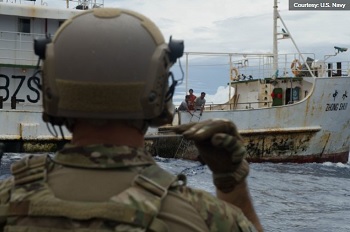
Hawaii’s Fishermen Are Worried About China’s Fleet. So Is The Military
Hawaii’s commercial fishermen and the U.S. military have a potential threat in common, China’s fleet of government-subsidized ships that has been straying into more distant waters in search of seafood and more influence. Local longliners have reported seeing increasing numbers of Chinese vessels near the islands, accusing them of overfishing and intimidation tactics. Sometimes the ships are fishing, sometimes they’re making their way into the eastern Pacific and sometimes they’re seemingly just sitting at sea, says Eric Kingma, executive director of the Hawaii Longline Association. >click to read< 08:05
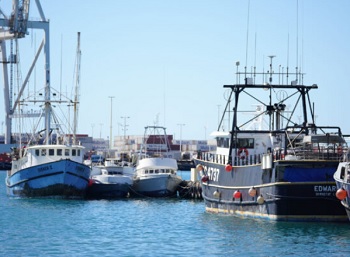
Hawaii Longline Association Takes Action To Fight Poor Conditions And Human Trafficking
Eric Kingma, HLA executive director, says the local longline fleet has already taken several steps to ensure Hawaii’s fishermen are treated humanely. While he took issue with some of the findings of the AP articles, he acknowledged it sparked a needed conversation about how foreign fishermen are treated. “That report did damage to the reputation of our fishery,,, “Certainly, we took the issue very seriously and responded with our own review of crew, captains and vessel owners.” He said HLA’s internal review did not find any evidence of human trafficking or forced labor in the longline fleet, which is made up of about 140 vessels and nearly 700 foreign fishermen. >click to read< 08:29
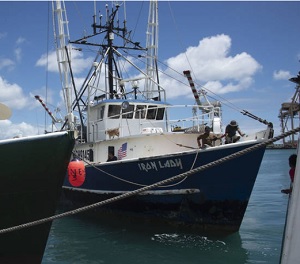
Honolulu mayor announces new ‘fish-to-dish’ program to help Hawaii’s struggling fishing industry
“We have an incredible longline fishing industry,” said Caldwell during a news conference at Pier 38, “and local fishermen who go out every day in grueling conditions, catching fish and bringing it back to feed our residents and visitors.” But the longline fishing industry has lost an estimated $10 million, or about 60% in revenue, since mid-March lockdowns went into effect due to the pandemic, Caldwell said. In an effort to help, he said the city is committing $2.6 million in federal coronavirus funds to help the fishing industry get back on its feet. The “fish-to-dish” program will work in partnership with the Hawaii Longline Association, the United Fishing Agency, which runs the fish auction, and Hawaii Seafood Council to distribute fish to the community.>click to read< 08:23
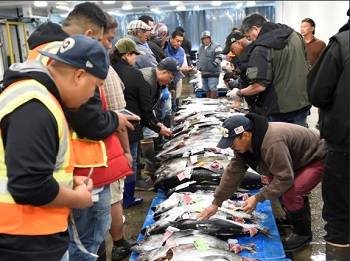
Coronavirus: Hawaii Fishermen Are Stuck In Port As Federal Aid Falls Short
With tourism all but shut down due to Hawaii Gov. David Ige’s 14-day quarantine and restaurant service reduced to takeout for social distancing purposes, there’s less demand for fish. Prices have dwindled to the point where going out on the water can be more expensive for fishermen than the price of the catch coming in. State and federal governments have done little to help out, despite the fact that fish are a critical source of protein for the islands’ residents. “We are the largest food producing industry in the state by a tremendous margin,” said Michael Goto, who’s the auction manager for United Fishing Agency in Honolulu. “If we saw a complete shutdown of fishing effort that would be devastating.” >click to read< 16:23
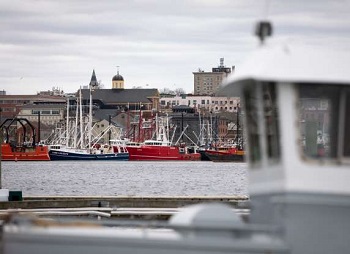
Commercial fishing industry in free fall as restaurants close, consumers hunker down and vessels tie up
The novel coronavirus pandemic has destroyed demand for seafood across a complicated U.S. supply chain, from luxury items such as lobster and crab, generally consumed at restaurants, to grocery staples sourced from the world’s fish farms. Now, with restaurants closed, many of the nation’s fisheries — across geography, species, gear types and management — have reported sales slumps as high as 95 percent. Boats from Honolulu to Buzzards Bay, Mass., are tied up dockside, with fisheries in the Atlantic, the Pacific, the Gulf of Mexico and Alaska affected, throwing thousands of fishermen out of work and devastating coastal communities. >click to read< 16:52
Longline fishing industry scrutinized for hiring of foreign fishermen
 The Hawaii Longline Association has jumped into a legal fight they say threatens their livelihood. Longliners oppose a Maui fisherman’s complaint against the state. In a Circuit Court filing, the association defends its practice of hiring fishermen from foreign countries and challenges a lawsuit filed by fisherman Malama Chun. He demands the state stop issuing commercial fishing licenses to foreign fishermen.,,, But Longline Association president Sean Martin said there’s nothing illegal about the state’s licensing practices. click here to read the story 08:02
The Hawaii Longline Association has jumped into a legal fight they say threatens their livelihood. Longliners oppose a Maui fisherman’s complaint against the state. In a Circuit Court filing, the association defends its practice of hiring fishermen from foreign countries and challenges a lawsuit filed by fisherman Malama Chun. He demands the state stop issuing commercial fishing licenses to foreign fishermen.,,, But Longline Association president Sean Martin said there’s nothing illegal about the state’s licensing practices. click here to read the story 08:02
Hawaii bill would ban licenses for some foreign fishermen
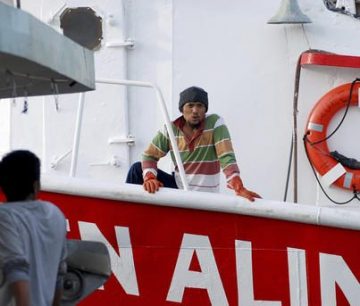 A bill in the Hawaii Legislature aims to change rules for how fishing licenses are issued to foreign crew members that make up the majority of the state’s commercial fleet. Now, boat owners or captains bring foreign crew members’ passports and customs documents to a state agency to get their licenses – without the fishermen present. A federal legal loophole allows foreign fishermen to work off the coast of Hawaii, but they are technically not allowed to enter the country. The bill would require anyone seeking a commercial fishing license in Hawaii to appear in person. State Sen. Karl Rhoads says he wants to change the law so people who are not permitted to enter the U.S. cannot get a license to fish on American-flagged boats sailing from Honolulu. The Hawaii Longline Association opposed the bill, saying the industry is already regulated and additional requirements are unnecessary. Read the story here 16:00
A bill in the Hawaii Legislature aims to change rules for how fishing licenses are issued to foreign crew members that make up the majority of the state’s commercial fleet. Now, boat owners or captains bring foreign crew members’ passports and customs documents to a state agency to get their licenses – without the fishermen present. A federal legal loophole allows foreign fishermen to work off the coast of Hawaii, but they are technically not allowed to enter the country. The bill would require anyone seeking a commercial fishing license in Hawaii to appear in person. State Sen. Karl Rhoads says he wants to change the law so people who are not permitted to enter the U.S. cannot get a license to fish on American-flagged boats sailing from Honolulu. The Hawaii Longline Association opposed the bill, saying the industry is already regulated and additional requirements are unnecessary. Read the story here 16:00
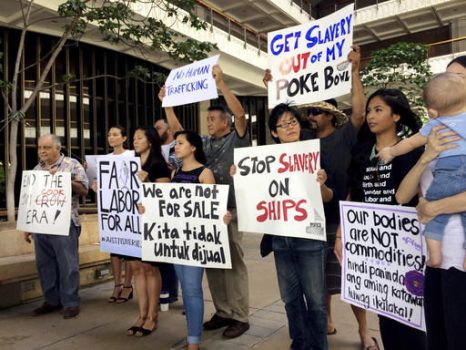
Officials say they cannot enforce Hawaii fishing contracts
Federal officials cannot enforce a contract being proposed by the commercial fishing industry as a solution to concerns about foreign fishing crews in Hawaii, leaving the industry responsible for enforcing its own rules. Federal and state officials met with vessel owners, captains and representatives from the fleet Thursday at a pier in Honolulu. The normally private quarterly meeting was opened to media and lawmakers to discuss conditions uncovered in an Associated Press investigation that found some foreign fishermen had been confined to vessels for years. On Wednesday, Hawaii state Rep. Kaniela Ing held a public meeting at the state Capitol on the issue. Ing and other lawmakers pressed representatives from the fishing industry and government agencies about what can be done to increase oversight and improve conditions in the industry. Read the story here 09:31
Hawaii lawmakers hold public meeting on foreign fishermen
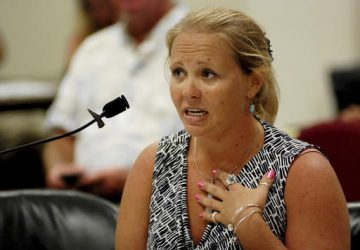 A woman who worked as an observer on fishing boats that docked in Honolulu described for Hawaii lawmakers what it was like without toilets, showers or hot water. “You have a cold water deck hose as a shower…the water tastes like iron,” said Ashley Watts, a former observer for the National Oceanic and Atmospheric Administration. Watts’ comments to lawmakers at the state Capitol Wednesday followed an Associated Press investigation that found some fishermen have been confined to vessels for years. A federal loophole allows the foreign men to work but exempts them from most basic labor protections. Many foreign fishermen have to stay on the boats because they are not legally allowed to enter the United States. Before the meeting, a group of Hawaii residents and activists rallied outside the state Capitol to call for better conditions for fishermen, demanding an end to what they call unacceptable living and working conditions. Read the story here 13:25
A woman who worked as an observer on fishing boats that docked in Honolulu described for Hawaii lawmakers what it was like without toilets, showers or hot water. “You have a cold water deck hose as a shower…the water tastes like iron,” said Ashley Watts, a former observer for the National Oceanic and Atmospheric Administration. Watts’ comments to lawmakers at the state Capitol Wednesday followed an Associated Press investigation that found some fishermen have been confined to vessels for years. A federal loophole allows the foreign men to work but exempts them from most basic labor protections. Many foreign fishermen have to stay on the boats because they are not legally allowed to enter the United States. Before the meeting, a group of Hawaii residents and activists rallied outside the state Capitol to call for better conditions for fishermen, demanding an end to what they call unacceptable living and working conditions. Read the story here 13:25
What Quota? Hawaii Longliners Are Fishing For Ahi Again
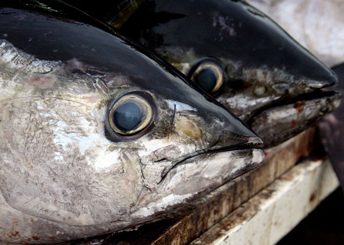 Hawaii’s longline fishermen are back at sea in search of more ahi after extending their quota limit through an agreement with the Commonwealth of the Northern Mariana Islands. The 2016 season had ended early, as it has for the past few years, when the longline fleet in late July hit its 3,554-ton limit for bigeye tuna in the Western and Central Pacific. The deal between Quota Management Inc. President Khang Dang and Northern Marianas Gov. Ralph Torres involves paying the territory $250,000 for 1,000 tons of its 2,000-ton limit. Under the agreement, QMI can assign its rights and obligations to the Hawaii Longline Association, a wholly owned subsidiary of QMI. The association is a nonprofit trade group formed to support the $100 million commercial longline fisheries industry, which includes a fleet of roughly 140 vessels ported in Honolulu. (the author seem to have an axe to grind) Read the story here 09:53
Hawaii’s longline fishermen are back at sea in search of more ahi after extending their quota limit through an agreement with the Commonwealth of the Northern Mariana Islands. The 2016 season had ended early, as it has for the past few years, when the longline fleet in late July hit its 3,554-ton limit for bigeye tuna in the Western and Central Pacific. The deal between Quota Management Inc. President Khang Dang and Northern Marianas Gov. Ralph Torres involves paying the territory $250,000 for 1,000 tons of its 2,000-ton limit. Under the agreement, QMI can assign its rights and obligations to the Hawaii Longline Association, a wholly owned subsidiary of QMI. The association is a nonprofit trade group formed to support the $100 million commercial longline fisheries industry, which includes a fleet of roughly 140 vessels ported in Honolulu. (the author seem to have an axe to grind) Read the story here 09:53
Hawaii longline industry creates task force to respond to allegations of human trafficking and poor working conditions.
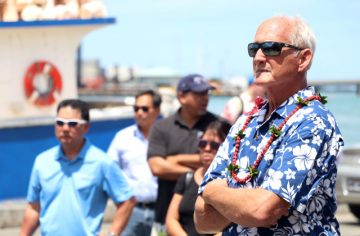 Hawaii longline industry leaders say they have formed a task force and hired an expert on slavery in response to media reports about human trafficking, forced labor and poor working conditions aboard some of their boats. “We’re trying to get a sort of fleet assessment, get our arms around the problem and see where we’re going to take it,” said Jim Cook, who owns several longline fishing boats and serves on the Hawaii Longline Association board of directors. He said Monday that the goal is to weed out the “bad actors,” in part by requiring a universal crew contract that incorporates international norms to address forced labor. That contract is being finalized and should be “ready to rock” in the next couple days, Cook said. The task force also includes John Kaneko, program manager of the Hawaii Seafood Council, Khang Dang, president of Quota Management, and Katrina Nakamura, who was also hired as a consultant to provide guidance to the industry. Read the story here 08:25
Hawaii longline industry leaders say they have formed a task force and hired an expert on slavery in response to media reports about human trafficking, forced labor and poor working conditions aboard some of their boats. “We’re trying to get a sort of fleet assessment, get our arms around the problem and see where we’re going to take it,” said Jim Cook, who owns several longline fishing boats and serves on the Hawaii Longline Association board of directors. He said Monday that the goal is to weed out the “bad actors,” in part by requiring a universal crew contract that incorporates international norms to address forced labor. That contract is being finalized and should be “ready to rock” in the next couple days, Cook said. The task force also includes John Kaneko, program manager of the Hawaii Seafood Council, Khang Dang, president of Quota Management, and Katrina Nakamura, who was also hired as a consultant to provide guidance to the industry. Read the story here 08:25
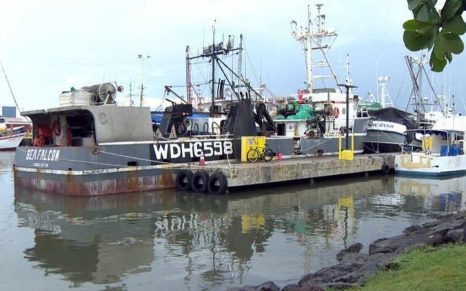
Hawaii’s Longline Fishing industry pushes back following questions about labor practices
Allegations of harsh treatment of workers in Hawaii’s longline fishing fleet have made headlines nationally. Now, the industry is defending itself, one day after a grocery store chain stopped buying tuna from Hawaii’s fish auction. There are 140 longline boats and 700 fishermen in Hawaii’s fishing fleet. The undocumented workers’ employment is legal. “It’s a very in-demand job for them,” Hawaii Longline Association president Sean Martin said. University of Hawaii professor Uli Kozok interprets for Indonesian fishermen. He’s heard complaints of physical abuse aboard the boats. “They’re quite a few stories that I’ve heard where fishermen were beaten by the captain or by the first officer,” he said. He said fishermen complain of insufficient food and third-world working conditions. Martin thinks the allegations are unfounded. “It’s a long ways from slave labor and human trafficking,” he said. Read the story here 11:25
Hawaii fishermen upset at Hawaii monument expansion
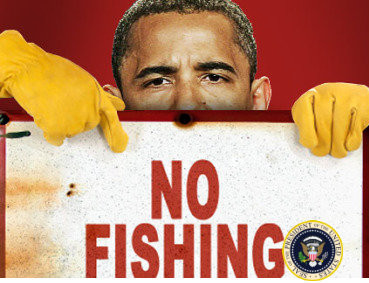 President Barack Obama is to travel to Hawaii this week to mark the new designation of the expanded Papahanaumokuakea Marina National Monument which he signed despite strong opposition from the Hawaii fishing industry. President Obama who was born in Hawaii is expected to cite the need to protect public lands and waters from climate change. The Western Pacific fishery Management Council of which American Samoa is a member voiced disappointment with Obama’s decision, saying it “serves a political legacy” rather than a conservation benefit. Council member from American Samoa Taulapapa Willie Sword told KHJ News in a recent interview the territory should be concerned with the Hawaii monument expansion because “we could be next.” There was also opposition from the fishing industry in Hawaii. Sean Martin, the president of the Hawaii Longline Association, said his organization was disappointed Obama closed an area nearly the size of Alaska without a public process. “This action will forever prohibit American fishermen from accessing those American waters. Quite a legacy indeed,” he said in an email to The Associated Press. The Pew Charitable Trusts helped lead the push to expand the monument. Read the rest here 11:39
President Barack Obama is to travel to Hawaii this week to mark the new designation of the expanded Papahanaumokuakea Marina National Monument which he signed despite strong opposition from the Hawaii fishing industry. President Obama who was born in Hawaii is expected to cite the need to protect public lands and waters from climate change. The Western Pacific fishery Management Council of which American Samoa is a member voiced disappointment with Obama’s decision, saying it “serves a political legacy” rather than a conservation benefit. Council member from American Samoa Taulapapa Willie Sword told KHJ News in a recent interview the territory should be concerned with the Hawaii monument expansion because “we could be next.” There was also opposition from the fishing industry in Hawaii. Sean Martin, the president of the Hawaii Longline Association, said his organization was disappointed Obama closed an area nearly the size of Alaska without a public process. “This action will forever prohibit American fishermen from accessing those American waters. Quite a legacy indeed,” he said in an email to The Associated Press. The Pew Charitable Trusts helped lead the push to expand the monument. Read the rest here 11:39
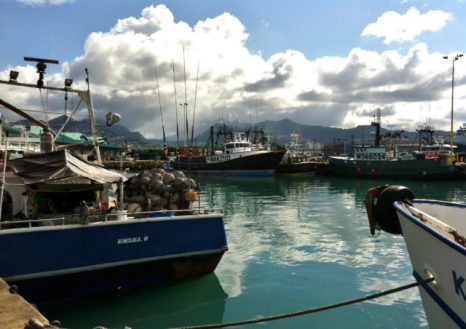
Would Hawaii Marine Monument Expansion Hurt The Tuna Industry?
Conservationists and others are crying foul over letters that state lawmakers recently sent President Obama that urged him to not consider expanding the Northwestern Hawaiian Islands Marine National Monument. They’re specifically concerned about the numbers used to justify opposition, calling the estimated $7 million financial hit to the longline tuna fishing industry misleading at best. “It’s just a false logic to suggest that a mobile fishery resource has to be fished in this particular location,” said David Henkin, staff attorney for Earthjustice, a nonprofit environmental law organization. “You’re talking about catching fish,” Henkin said. “You’re not cutting down trees. You’re not mining for gold.” Representatives of the longline fishing industry say it’s not so much about how much money from ahi they would potentially lose if the monument is expanded as it is about the government further limiting the places they can fish. “The fact of the matter is that we continue to be squeezed out of traditional areas,” said Sean Martin, president of the Hawaii Longline Association. Read the story here 08:04






